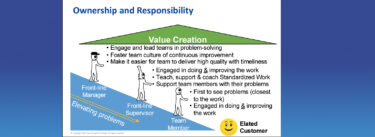I just finished reading another interview with a pillar of the lean community, and as usual, it was interesting and thought-provoking. About halfway through, however, came that phrase again: “Lean is simply X.” I couldn’t disagree, but “simply X” was different than the last 99 expert interviews where Lean was also “simply Y, Z, P, D, Q,” and a whole bunch of other things. Hmmm… maybe Lean isn’t so simple after all?
“Lean” has definitely evolved over time and that wouldn’t be a bad thing if it was really getting easier to understand and implement. But today, there are as many flavors of Lean as there are consultants, authors, and professional groups – none of which have much incentive to agree if they want to differentiate themselves (“Our Lean’s better than your Lean!”). According to the history books, the Scientific Method and standard work were alive and well in Ancient Egypt while the Ancient Chinese had their own impressive quality systems. One could easily argue that Lean is just an ongoing evolution of natural business thinking. Other schools of thought include pursuit of perfection, constant learning and problem solving, ongoing experimentation, everything a company does, and even that Lean is a religion. And of course we can’t leave out the thousands of books, articles, and PowerPoint presentations describing how the Toyota Production System is true Lean. I personally subscribe to Lean being unique and situational to each organization and emerging under the right conditions because so far that model appears to have much more success.
Stepping back, however, I am not sure that “What’s Lean?” really matters as much as this forward-looking question: “What Should Lean Mean To Us?” A problem is just the gap between where you are now and where you need to be. If you are working on the problem of how to begin your situational Lean journey, what is the gap between your current mental model of Lean and what Lean needs to be to deliver success in your specific circumstances?
Here are some questions to get you started:
How do you encourage everyone to think for themselves? There is plenty of free business advice for the taking, but instead of jumping to follow generic recommendations and copying others’ solutions (aka “Solutions Thinking”), how can you be more productive by engaging everyone in critical thinking, learning, and problem solving? Have you considered how to advance your thinking beyond your current systems and reporting?
Why are you considering Lean in the first place? What results does the business need from change and what problems do you think Lean is going to solve? By many definitions, Lean is a solution, but have you determined what specific business problems you are trying to solve with Lean and what the real root causes are yet? What are your customers, employees, shareholders, suppliers, and competitors saying that leads you to believe you need to change this way and this much?
What is your business strategy and how might you leverage Lean to support and improve it? Becoming a higher performing organization should be the goal – not “becoming lean.” I have written about the critical need for a good strategy in the past in: “The Biggest Waste of All.”
What is already working that you want to keep? Just because you are engaging in improvement doesn’t mean that everything has failed and needs to change. Not only does maintaining some stability keep confusion down, but highlighting that your organization has done some great things in the past builds confidence that it can be done again. I’ve experimented in workshops where we either started with the positive or else dove straight into problems, and the positive starts always had higher engagement and better problem solving.
What would Lean feel like in your organization? How would you notice people thinking and acting differently? Like it or not, we humans are all highly emotional, and it has been proven that we cannot even choose which socks to wear without engaging the emotional portions of the brain. So put down your whiteboard markers for a minute and describe to your colleagues how this change would look and feel. It might be impossible to measure how “good” or “lean” your culture is, but you can calibrate your guts to know if the organization is getting better.
Do you have enough organizational capacity and attention span to see it through? Do you have the leadership skill to handle this much change? A half-hearted (and failed) attempt to change does more harm than good. Be honest now – what are you really attempting and what is it going to take to get there? Do you have leaders that are able to not just coach others, but see their own problems and change their own behavior accordingly? I have recently visited two companies where the CEOs were trying very hard to drive Lean, yet their executive reports had no interest what-so-ever. The working level staff all desperately wanted improvement too, but without a shared vision of Lean, there was actually more waste and stress because nobody knew which direction to “improve” towards.
Are you willing to let a unique version of Lean emerge from within the organization? Many hands-on managers (not to mention control freaks) are uncomfortable giving their organizations the freedom they need to define and create change within their value streams. Instead, they prefer to work to detailed plans with tight coordination and lots of reporting. “How many Kaizens have we had this year? Only 73?! We need 37% more! Now everybody get on the ground and give me 10 A3s!” Those organizations with more freedom to learn and define the “how’s?” often have the best results because of greater motivation from pride, ownership, and autonomy. I have written about this phenomena in the past in: “Are We ‘Doing Lean’ All Wrong?”
We are all doing this lean thing because we want our organizations to think and act not just differently, but better in our very specific situations. It will require more initial work to decide which Lean flavor you want to create, but I guarantee you will be much happier with the results if you do. What you feel you need will no doubt change over time as you learn and your version of improvement emerges, but starting off pointed in the right general direction will help build momentum much faster toward an even better future state.
So put aside all that stuff that the “experts” have told you about what Lean is, and instead ask “what should Lean mean to us?” so we will succeed.






